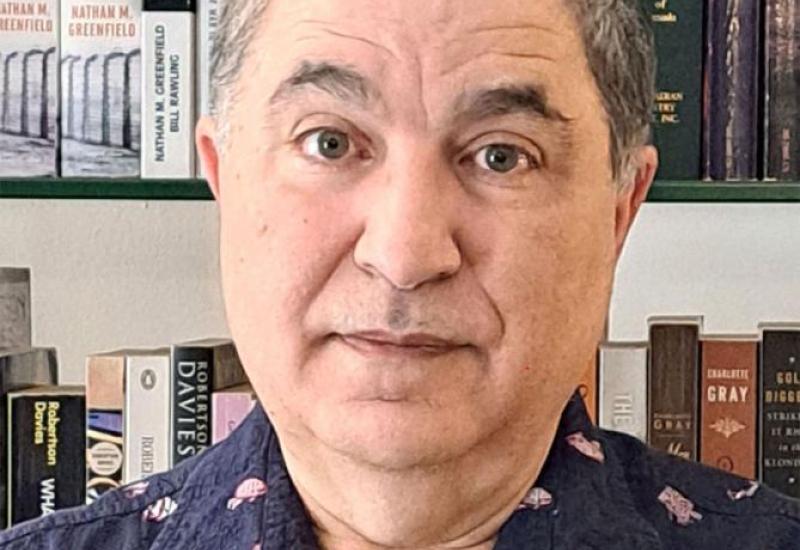Dr. Nathan Greenfield, a scholar and researcher in the field of literary theory and military conflict, author of many books, lives and works in Canada. For the second year in a row, he has been a volunteer at the FSP Sociology Department and regularly lectures to students, mainly undergraduate and graduate students. Pavlo Fedorchenko-Kutuev, Professor of the Department of Sociology at the FSP, spoke with him about his academic interests, his “discovery” of Ukraine, and his experience of communicating with Ukrainian colleagues and students.
📰
- Tell us about your education and academic interests. How do you manage to combine literary theory, sociology and the history of military conflicts?
- My doctoral dissertation (McGill University, Montreal, Canada) was on 19th-century American literature. It focused on the African-American writer Charles W. Chesnutt. I showed how his short stories and novels criticized the racist prejudices of his time and, unfortunately, of ours.
My master's thesis (also from McGill University) was in literary theory, specifically the philosophy of history in the works of Georg Lukács. I used the works of Walter Benjamin to criticize Lukács.
In fact, I have always been interested in the intersection of literature and history/sociology. In addition, I have long been interested in military history and have even written seven books on military history since 2004.
While a large percentage of military history is “facts on the ground,” a significant portion relies on historical narratives (speeches, documents, news reports, and interviews) to determine how real-life characters-soldiers, sailors, or airmen (both men and women)-came to be where they were. The paper trail of operational orders, logistics, industrial supplies, etc. forms a database similar to that of a novel or a series of sonnets, and you can ask the same questions of it as you would a literary database.
This is probably easier to see if you look at the speeches or media products of civil society: think of Putin's rhetorical attacks on Ukraine and the many novels and video games that Russia created in the years before the full-scale invasion. While Ukrainians can clearly see where they were headed, explaining this to Westerners, and especially North Americans, means practicing literary criticism, offering an informed, sober view of the war that Putin waged in eastern Ukraine before the full-scale invasion.
- How and when did you discover Ukraine?
- Before I started writing about higher education in the wake of Russia's full-scale invasion, I knew about Ukraine from my university courses on Eastern Europe and Soviet history. After being immersed in the realities of today, I felt really confused. After all, in the studies of the Tolstoyevs, there was no mention of the colonial attitude of these writers towards Ukraine. Russia's centuries-old imperial project in Ukraine was equated with moving through the supposedly empty east. Ukraine's central geographical location also did not receive the degree of attention it should have: Germany's borders, yes; Poland disappearing from the map, yes; the slow disintegration of the Ottoman Empire, yes. But the importance of Ukraine, to use a child's language, was "not so great."
- What is your experience of communicating with Ukrainian scholars? What did you discover for yourself?
- Ukrainian scholars gave me their time and expertise, essentially giving me lessons in Ukrainian history. Again and again I was surprised that Ukrainian scholars know American history and society better than most Americans.
- How was your teaching experience with KPI students and was it useful?
- It was very useful. The students are interested, enthusiastic, and insightful, especially when you consider that they live and study in wartime.
- Do you have a favorite sociologist?
- Yes, it is William Edward Burckhardt Du Bois.
- Which sociologist, in your opinion, demonstrated the most relevant style of thinking for our time?
- I have to say Walter Benjamin here, although he was not a "pure" sociologist. For me, Benjamin's method of going against the established opinion, of asking questions, is what the analysis of society should look like. Take, for example, his reflections on the shopping arcades built in Paris in the nineteenth century and how they turned commerce into a theater and everyone who passed through them into actors in the drama of bourgeois shopping.
His theses on the philosophy of history, especially the one that states that "every document of civilization is also a document of barbarism," should be the guiding principle of analysis. Take, for example, our smartphones. These are incredible technical devices, the pinnacle of science and engineering. But the rare earth elements used to make them come mainly from mines in Africa, where miners work in extremely poor conditions. So that we can have touch screens and share photos of cats and breakfasts, many of these workers are poisoned and die.
- What is your favorite piece of literature?
- Moby Dick by Herman Melville.
- What advice would you give to Americans and Canadians to better understand relations with Ukraine?
- To study the history of Ukraine. They can start with the Holodomor, because from a North American perspective, this tragic period most clearly demonstrates Russia's intention to destroy Ukraine and Ukrainians and is also free of Trump's nonsense.
- What advice do you have for Ukrainian students?
- My advice is simple: keep studying!

